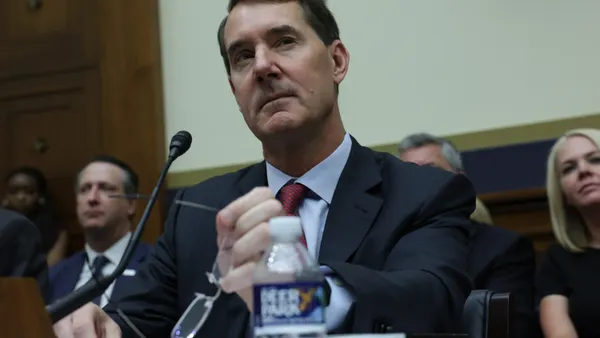Dive Brief:
- Commissioners in Pennsylvania’s Lehigh County voted 6-3 last week to approve a plan to divest $145 million in assets from Wells Fargo over the bank’s donations to organizations that support anti-abortion politicians.
- Wells Fargo told staff last month it would reimburse employees and their dependents for travel and lodging costs associated with traveling more than 50 miles for healthcare services, such as abortions, according to a memo seen by Reuters. However, the bank has contributed more than $120,000 to the National Republican Senatorial and Congressional Committees during the 2022 election cycle, Bloomberg reported Thursday, citing data from Open Secrets.
- Lehigh County officials are hardly the first to suggest pulling their business from a bank over the financial institution’s political stances. Republican lawmakers in the House and Senate have urged their chambers to end their contractual relationships with Citi, which in March pledged to cover travel expenses for employees seeking abortions.
Dive Insight:
Citi may have been the first big bank to take a public stance on abortion support for employees. But several others, such as Bank of America, JPMorgan Chase, Goldman Sachs and Wells Fargo followed suit shortly after the Supreme Court overturned Roe v. Wade in June.
At the same time, abortion is not the only issue that has spurred officials to propose barring some financial institutions from accessing government money. West Virginia State Treasurer Riley Moore alerted BlackRock, Wells Fargo, JPMorgan Chase, Morgan Stanley, Goldman Sachs and U.S. Bank that they would be restricted from access to state contracts over perceived lending discrimination against the fossil-fuel industry. West Virginia ranks as the nation’s second-leading coal-producing state.
Lehigh County’s legal department is set to make recommendations about next steps, including whether the county must hold a request for proposal process to find a new financial institution for their assets. That could take up to six months.
Robert Sumner, a Wells Fargo spokesperson, said the bank is “ready to engage with commissioners to discuss our service to the county and the value Wells Fargo has provided for its residents.”
“It is disappointing to see that the county has chosen to begin the process of divesting,” he told Bloomberg in a statement.
While pushes in Congress to punish Wells’ competitor, Citi, over its policy have come from conservatives, the Lehigh divestment plan marks action in an area whose voters skew more liberal.
The county is represented in Congress by Rep. Susan Wild, a Democrat. And voter registration statistics from 2021 show 114,313 Democrats in the county, compared with 82,447 Republicans. But Pennsylvania is a swing state with a sizable red streak. The state’s Republican senator, Pat Toomey, the ranking member of the Senate Banking Committee, calls Lehigh County home. (Toomey was not among the 10 Republican senators who expressed “deep concern” over Citi’s abortion-related policy.)
A divestiture would give Lehigh County a chance to “hit” Wells Fargo “on their balance sheets,” Controller Mark Pinsley told Bloomberg.
It remains to be seen, though, how broad an effect such a move would have — or whether it would prompt follow-on action from other constituencies.
“We've seen these kinds of divestments and boycotts work in the past, but it's a matter of scale,” Nina Ahmad, president of the Pennsylvania chapter of the National Organization of Women, told Bloomberg.
Wells Fargo contributed $100,000 to the Republican Governors Association, according to a company document. The bank has given a further $101,800 to the organization since 2021, according to Popular Information.
“As the only woman on the [Lehigh County Board of Commissioners], it’s important that in light of Roe being overturned that we begin to look at things in an in-depth way,” Zakiya Smalls said in a statement. “We have an opportunity to choose whether we want to continue a relationship with a bank that takes partisan stances or a regional bank that is invested in our community.”














